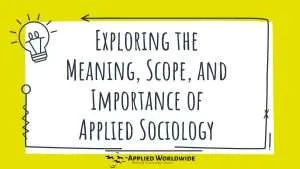In the dynamic landscape of talent management, organizations are increasingly turning to sociological strategies to not only attract top-tier talent but also foster a work environment that retains and nurtures skilled professionals. This blog explores the intersection of sociology and talent acquisition, shedding light on innovative approaches that go beyond traditional HR methodologies. As we delve into sociological insights, we uncover powerful strategies that can reshape how companies attract, engage, and retain their most valuable asset—human capital.
Understanding Organizational Culture: A Sociological Lens on Talent Attraction
Effective talent acquisition begins with a deep understanding of organizational culture. This section explores how sociological perspectives can inform the creation of an inclusive and compelling workplace culture that resonates with diverse talents. From analyzing social dynamics within teams to fostering a sense of belonging, sociological insights provide a roadmap for crafting an environment where individuals not only excel but also feel a genuine connection to the organization.
Understanding Organizational Culture

In the pursuit of attracting and retaining top-tier talent, organizations must first unravel the intricate tapestry of their own organizational culture. The foundation of effective talent acquisition lies in a deep understanding of the values, norms, and social dynamics that shape the workplace environment.
Sociological perspectives offer a unique lens through which to decipher these cultural intricacies. By employing sociological insights, companies can navigate beyond superficial aspects and delve into the core elements that define their organizational identity.
Crafting an Inclusive Work Environment
Sociological perspectives serve as invaluable guides in the mission to create an inclusive and compelling workplace culture. This involves not only acknowledging diversity but actively leveraging it as a strategic advantage. By analyzing social dynamics within teams, organizations can identify and address potential barriers to collaboration and cohesion.
Furthermore, sociological insights provide a roadmap for fostering a sense of belonging among employees from various backgrounds. Strategies such as creating cross-functional teams, implementing mentorship programs, and promoting open communication channels become instrumental in crafting an environment where individuals not only excel professionally but also feel a genuine connection to the organization on a personal level.
Nurturing Connection and Excellence
Building on sociological principles, organizations can instill a sense of camaraderie and shared purpose among their workforce. By acknowledging the importance of social relationships in the workplace, companies can implement strategies that nurture a positive and collaborative atmosphere.
Sociological frameworks encourage leaders to go beyond superficial interactions and invest in creating a workplace where individuals feel heard and valued. This not only enhances job satisfaction but also contributes to increased productivity and employee loyalty. In essence, the sociological approach to understanding organizational culture becomes a cornerstone in building an environment where talent is not only attracted but is inspired to thrive and contribute meaningfully.
Networks and Relationships
Sociological strategies emphasize the importance of networks and relationships in talent acquisition. This section delves into the power of social capital, illustrating how organizations can leverage existing networks and build strategic relationships to identify and attract high-caliber professionals. By understanding the sociological nuances of professional connections, companies can create a talent pipeline that aligns with their long-term goals.
Leveraging Networks and Relationships
In the realm of talent acquisition, sociological strategies underscore the paramount importance of networks and relationships. This section plunges into the dynamics of social capital, illuminating the ways organizations can harness this power to identify and attract high-caliber professionals.
At the core of sociological principles lies a profound understanding of the intricate web of professional connections that permeate industries. By delving into the nuances of these connections, companies can strategically position themselves to tap into existing networks and forge relationships that serve as conduits for attracting top-tier talent.
Unveiling the Power of Social Capital
Sociological perspectives shed light on the strategic imperative of social capital in the realm of talent acquisition. Beyond traditional recruitment methods, organizations can cultivate and leverage social capital to gain a competitive edge. This involves not only recognizing the influence of interpersonal relationships but actively nurturing them to create a robust talent ecosystem.
By investing in initiatives that promote collaboration, knowledge sharing, and community building, companies can establish a reputation as desirable places to work, thereby attracting professionals who are not only highly skilled but also culturally aligned with the organization’s ethos.
Strategic Relationship Building for Long-Term Talent Goals
Understanding the sociological nuances of professional connections equips organizations with the tools to create a sustainable talent pipeline aligned with long-term goals. By weaving strategic relationships within and beyond the industry, companies can ensure a continuous influx of high-caliber professionals who resonate with their vision and mission.
Sociological insights guide talent acquisition teams in deciphering the social fabric of their respective sectors, enabling them to identify key influencers and thought leaders. This strategic relationship building not only addresses immediate hiring needs but also fortifies the organization’s talent pool for future growth and adaptability in an ever-evolving professional landscape.
Employee Engagement and Retention
Retaining top talent is as crucial as attracting it. This section explores sociological frameworks for employee engagement and retention, emphasizing the impact of social relationships within the workplace. From building a sense of community to fostering mentorship programs, sociological approaches provide actionable insights into creating an environment where employees feel valued and motivated to contribute to the organization’s success.
Prioritizing Retention
Recognizing the importance of retaining top talent as a strategic imperative, this section delves into the application of sociological frameworks in the realm of employee engagement and retention. Beyond the initial attraction, sustaining a workforce that is motivated, committed, and loyal is essential for an organization’s long-term success. Sociological insights offer a lens through which companies can understand the intricate dynamics that contribute to employee satisfaction and commitment.
The Impact of Social Relationships
At the heart of sociological perspectives on employee retention lies a profound acknowledgment of the impact of social relationships within the workplace. This extends beyond professional duties to encompass the development of genuine connections among colleagues. Building a sense of community becomes a cornerstone, fostering an environment where individuals feel not only connected to their work but also to the people they work with. Sociological approaches guide organizations in recognizing the intrinsic value of social bonds, highlighting their role in creating a positive and supportive workplace culture.
From Community Building to Mentorship
Sociological strategies translate into actionable insights for organizations looking to enhance employee retention. The emphasis on community building involves creating spaces for collaboration, open communication, and shared experiences, contributing to a workplace culture where individuals feel valued and connected.
Furthermore, the implementation of mentorship programs is explored as a sociological approach that goes beyond traditional professional development. By fostering mentor-mentee relationships, organizations provide avenues for knowledge transfer, skill enhancement, and personal growth, contributing to a holistic and engaging work environment.
In essence, sociological frameworks offer a comprehensive guide for organizations seeking to create an environment where employees not only find value in their work but are also motivated to contribute proactively to the success of the organization. Through an understanding of social dynamics, companies can shape retention strategies that resonate with the diverse needs and aspirations of their workforce.
Final Thoughts on Sociological Strategies for Talent Management
As organizations navigate the ever-evolving landscape of talent management, the integration of sociological strategies emerges as a transformative force. By aligning recruitment practices with a deep understanding of organizational culture, leveraging social capital, and prioritizing employee engagement, companies can not only attract top talent but also cultivate an environment where professionals thrive and choose to stay.
The sociological lens offers a holistic perspective that goes beyond traditional HR approaches, shaping the future of talent acquisition and retention.
Read: Josh Packard, PhD: Organizational Strategy and Management







